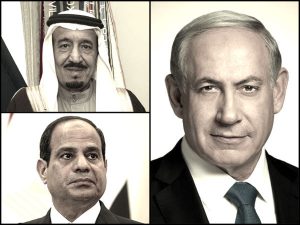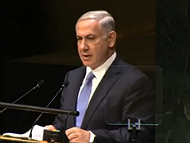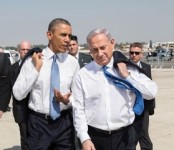
If U.S. can cozy up to Iran, can Israel, Egypt & Saudi Arabia be far behind?
In just one week, two signs of the times in a new, emerging Middle East:
- 1. Russia keeps its word to supply Iran with sophisticated S-300 anti-aircraft missiles, just dandy for shooting down Israeli jets that may try bombing Iranian nuclear weapons sites in the future.
- 2. Egypt transfers two strategic islands to Saudi Arabia to solidify their cooperation after U.S. signals they are on their own. Israel signs on to the emerging pact as a silent partner.
The writing has been on the wall for Saudi Arabia and Egypt. By closing the Iranian nuclear deal with the Ayatollahs, U.S. President Barack Obama has signaled to Riyadh and Cairo that they now occupy a lower place on America’s Middle East totem pole. So naturally these two leading Sunni Muslim states are closing ranks to face their bitter Shiite enemy, Iran
No longer dependent on Saudi oil, Washington’s departure has left a power vacuum that is being filled by Iran and Russia. Not that Tehran and Moscow are bosom pals – it’s more like President Putin is in dire need of money, not for his Panama bank account, but to fill the Kremlin’s coffers, which have depleted drastically by the plunging price of oil, a key export. And Tehran now has the cash flowing in after Obama’s brainwave of lifting the sanctions in return for delaying a probable nuclear showdown, until he departs the White House in less than a year. Iran, which has been starved of advanced foreign weapons, is drawing up a big shopping list. Maybe Putin sent his Sukhoi jets to buzz those US Navy ships in order to whet the appetite of Iran’s Air Force commander?
And what about Iran? There is one school of thought that the welcoming of Tehran back into the international fold will make most Iranians finally see the light of Barack Obama. A new and dominant public opinion will favor peaceful co-existence. The throngs will no longer chant ‘Death to America! Death to Israel!’ Nor will they revel in torching the Stars & Stripes and the Star of David. But for that to happen you must also believe that the regime of the ayatollahs and the Revolutionary Guards may eventually collapse due to the improving economic conditions.
Then there’s the other school of thought, which thinks the exact opposite – that the tough ayatollahs will have proved you can have your nuclear weapons program and also have butter to spread on your pitta as well. Will they then unveil the ultimate goal – the resurrection of the glorious Persian Empire?
And this footnote: the deployment of the new Russian missiles in Iran has long been in the works. Obviously, the masterminds in the Israel Air Force have been busy as bees working on a solution. In the past, they proved to have a knack for neutralizing Soviet anti-aircraft missiles. The Russians are no fools, and I bet they haven’t put their top secrets at risk by displaying them in Iran.
Riyadh-Cairo-Jerusalem axis…
It follows that if President Obama has enabled Shiite Iran to bounce back off the ropes with new vim and vigor to also take on the Sunni Muslim states, then Saudi Arabia and Egypt will circle their wagons in defense. This has just happened. On a visit to Cairo, Saudi King Salman and President Abdel Fattah el-Sisi signed a pivotal pact. In exchange for tens of billions of dollars in economic aid from the Saudis, el-Sisi handed back to Riyadh, the sovereignty over two strategic islands at the entrance to the Gulf of Aqaba. So this emerging alliance combines Egypt’s considerable military clout with Saudi Arabia’s very deep pockets. It is a force multiplier for both states.
But in this affair, it takes more than two to tango – Israel is a silent partner. In the Six-day War of 1967 – Egyptian President Gamal Abdel Nasser exploited the two islands of Tiran and Sanafir to blockade vital Israeli shipping through the Straits of Tiran to the port of Eilat. Big mistake on Nasser’s part – it actually precipitated the outbreak of war and the disastrous defeat of the Arab armies that had massed on Israel’s borders. In fact, the status of these two crucial islands was defined in the Israeli-Egyptian peace treaty. Therefore, Israel also had to be in on the Egyptian-Saudi deal, which it was. This is yet another sign that Jerusalem, Cairo and Riyadh have been collaborating behind the scenes in confronting not only Iran, but also Daesh.
Gaza simmering, again…
Israeli ‘Code Red’ sirens blared again along the Gaza border, and Israeli men, women and children again raced for their rocket shelters. Fortunately, it was a false alarm. But tension is again rising in the area. Consider that Hamas leader Ismail Haniyeh has just warned:
‘We are preparing our heroic forces to attack the Zionists above and beneath ground. When the time is right we will order them to strike with full force!’
The Hamas chief did not even try to hide that the Palestinians in Gaza are using cement supplied through Israel to dig tunnels to attack the Jewish state. This at a time in which the Palestinians complain to the UN that Israel is not supplying them sufficient cement to rebuild the damage caused by the war they started in the summer of 2014.
IDF Intelligence estimates that Hamas has still not recovered from the last conflagration and is not ready for a new flare-up. However it also thinks that there may be differences between the Hamas political leadership and the military wing that wants to act on its own and is in contact with Daesh. In any case, Israel is taking defensive measures including civil defense drills along the Gaza border. Hamas also says that IDF heavy equipment has been operating near the frontier, possibly hunting for the Hamas tunnels. There is now a risk of a miscalculation by either side that could cause a renewal in the fighting that neither side may want at this time. So if Gaza is now simmering, will it soon boil over?
IDF soldier faces manslaughter charge…
About three weeks ago in Hebron, an IDF soldier on duty was stabbed by two Palestinians. His comrades opened fire killing one of the attackers and seriously wounding the second, who was left lying in the street. A medical team from a Magen Adom Israeli ambulance had refused to treat the wounded Palestinian because they were not convinced he was not wearing an explosives belt under his heavy winter coat. It happened to be a warm day.
Meanwhile, the wounded Israeli soldier was treated by an IDF combat medic, who turned out to be his friend. A matter of minutes later, the medic then went to the nearby scene of the attack where a small group of soldiers and several officers had gathered near the two Palestinians on the ground. The wounded Palestinian then started moving and someone shouted: ‘He’s moving!’ The medic, who is a trained combat soldier, immediately shot the terrorist in the head, killing him on the spot. The officers at the sight deemed the wounded terrorist had no longer posed a risk and took the shooter into custody. This sparked a firestorm in Israeli public opinion. Some contended the soldier was guilty of killing the terrorist in cold blood and had violated the IODF’s code of ethics. Others argued that the shooter deserved a medal because if the soldier had been a suicide bomber he could have killed many Israelis.
Not all the facts are yet known, that will have to await the court-martial. But consider that in this particular incident, one soldier was nearly stabbed to death because he had not reacted swiftly enough to the Palestinian attack. And just yesterday, a Palestinian hit an IDF soldier in the head with a hatchet! Fortunately the soldier was wearing a helmet, which prevented him from being seriously hurt or even killed. Again, the soldier had not been alert enough. And again his comrades shot and killed the attacker. Make no mistake, these are life and death situations where soldiers must shoot to kill – otherwise they may end up dead.
Moreover, these are 18 and 19-year-old freshmen and sophomores put in such stressful situations, and mistakes in judgment may be made from time to time. Even in far less dangerous cases in the U.S. and elsewhere, hardly a week or so goes by without some policeman shooting a suspect because he feared for his life. Therefore the charge of manslaughter in this case is a stretch – even if the IDF high command wants to make a point to the troops.




